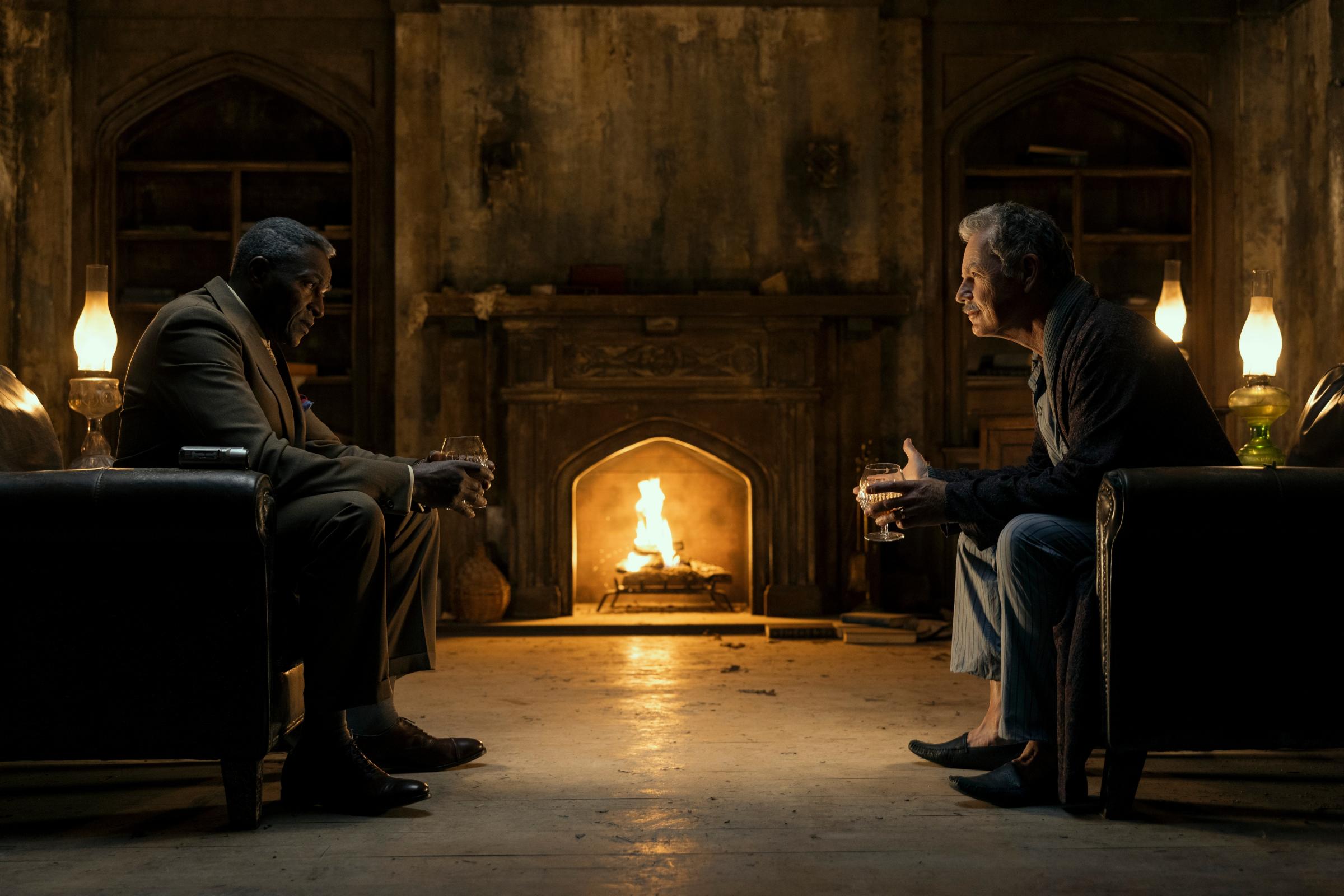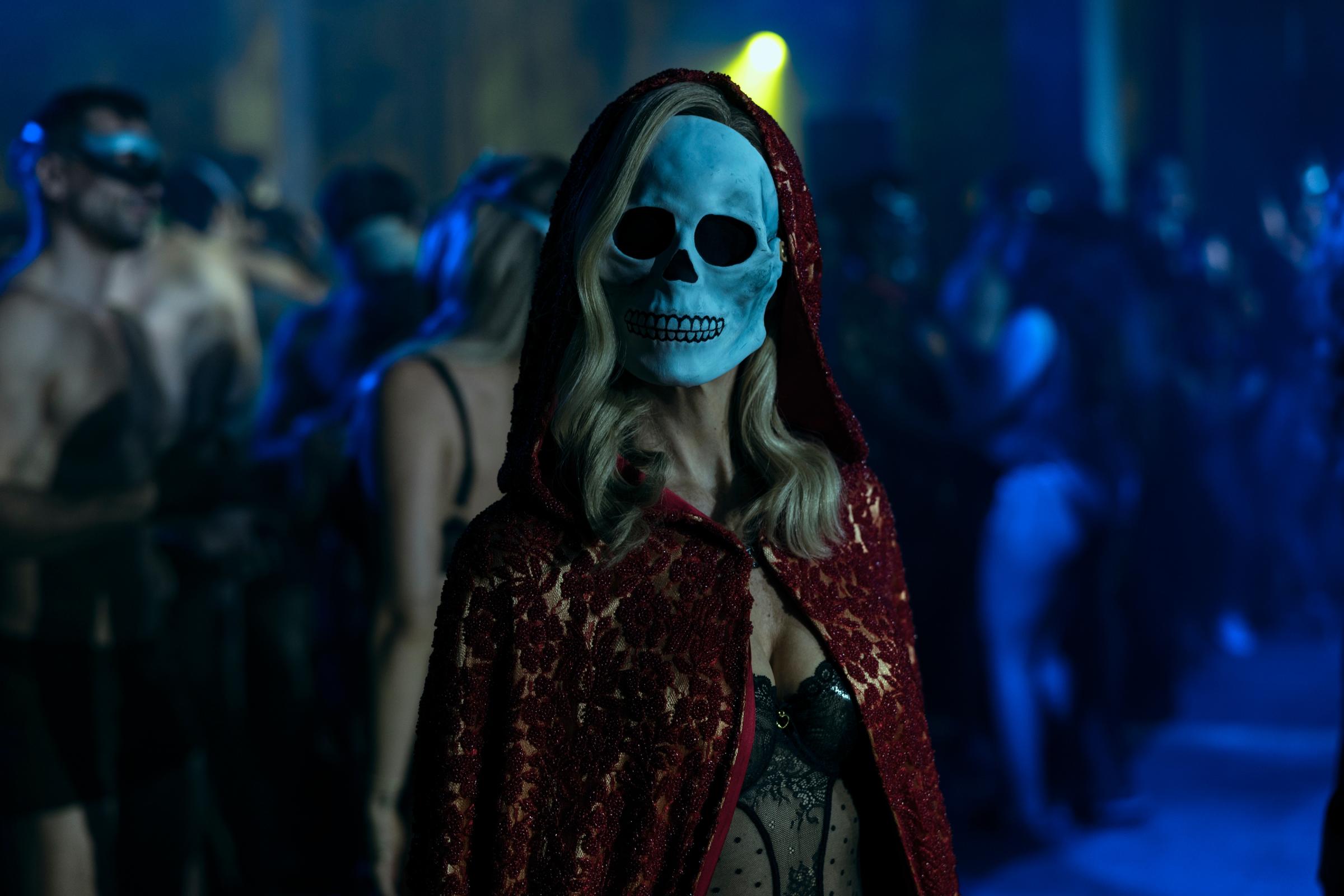Warning: This post contains spoilers for The Fall of the House of Usher.
Once upon a midnight dreary—or for those on the East Coast, 3 a.m.—horror maestro Mike Flanagan's new Edgar Allan Poe-inspired anthology series, The Fall of the House of Usher, arrived on Netflix.
Premiering Oct. 12, House of Usher is Flanagan's fifth spooky anthology series for the streamer, following in the wake of The Haunting of Hill House, The Haunting of Bly Manor, Midnight Mass, and The Midnight Club. And like its predecessors—with the exception of Midnight Mass—House of Usher is based on the work of a renowned horror author.
This time around, Flanagan turned to the poems and short stories of the Master of Macabre himself for a modern reimagining of Poe's 19th-century writings. The show puts a gothic spin on the story of the downfall of an opioid empire, featuring many of Flanagan's cast regulars and centering on the uber-wealthy Usher family and their drug company, Fortunato Pharmaceuticals—apparent fictional facsimiles of the infamous billionaire Sackler family and OxyContin manufacturer Purdue Pharma.
"[House of Usher is] the closest I will get to Giallo,” Flanagan told The Wrap in 2022, referencing the Italian horror subgenre known for marrying murder mysteries with the gratuitous violence and gore of slashers. “It’s wild. It is colorful and dark and blood-soaked and wicked and funny, and aggressive and scary and hilarious. I’ve never gotten to work on anything like it. We left everything on the field with it, and it’s just bombastic fun."
Poe's influence
The overarching narrative of The Fall of the House of Usher loosely follows Poe's 1839 short story of the same name. But the series also folds in references to other works by Poe, including the author's classic 1845 poem "The Raven" and enduring horror stories like 1842's "The Pit and the Pendulum," 1843's "The Tell-Tale Heart," and 1846's "The Cask of Amontillado."
In Poe's "House of Usher," an unnamed narrator comes to visit the decaying mansion of his childhood friend, Roderick Usher. The narrator is filled with an increasing sense of dread as time passes at the house, where Roderick is showing signs of madness and has become obsessed with death. After a few days, Roderick's twin sister Madeline, who has been suffering from a mysterious illness, dies and Roderick decides to temporarily bury her in the tombs below the estate. Roderick grows ever more uneasy following his sister's death until one night he bursts into the narrator's room and reveals that he believes they buried Madeline alive. The wind blows open the bedroom door and an escaped Madeline appears and attacks Roderick. The two die simultaneously as the narrator flees the house and looks back to see it crumble to the ground.

In the show, Usher family patriarch and Fortunato CEO Roderick Usher (Bruce Greenwood) invites assistant U.S. attorney C. Auguste Dupin (Carl Lumbly)—the name of the famed amateur investigator introduced in Poe's 1841 short story “The Murders in the Rue Morgue"—to his decrepit childhood home to confesses to his laundry list of crimes. Roderick's invite comes in the wake of the gruesome deaths of all six of his children in the span of a week—atrocities for which Roderick insists he is responsible.
As Roderick recounts his decades-spanning tale, Auggie can hear the sound of what Roderick says is his twin sister, Fortunato COO Madeline Usher (Mary McDonnell), banging around in the house's basement. Roderick's story largely flits between his early years working at Fortunato and the events that led up to each of his children's deaths. But he begins by jumping back in time to his own childhood to explain how he and Madeline came to accidentally bury their mother (Annabeth Gish) alive before she broke free from her premature grave to exact revenge on their father, onetime Fortunato CEO William Longfellow (Robert Longstreet).
At the end of Roderick's story—throughout which he's been tortured by visions of his dead children—Madeline, who Roderick himself tried to kill earlier that night, bursts out of the basement and, as her final act, strangles her brother to death as Auggie rushes from the collapsing house in a scene that mirrors the conclusion of Poe's tale.

The show's eight episodes are all titled after one of Poe's iconic works, with several of Roderick's children's deaths paying homage to the episode's corresponding story, from "The Masque of the Red Death" to "The Black Cat."
Roderick's children—Frederick (Henry Thomas), Tamerlane (Samantha Sloyan), Victorine (T'Nia Miller), Napoleon (Rahul Kohli), Camille (Kate Siegel), and Prospero (Sauriyan Sapkota)—as well as his granddaughter Lenore (Kyliegh Curran) and infallible lawyer Arthur Pym (Mark Hamill)—whose foreboding backstory draws from the plot of Poe's only novel, The Narrative of Arthur Gordon Pym of Nantucket—are all named after a Poe character.
In the flashbacks to Roderick's earlier life, his boss at Fortunato, Rufus Griswold (Michael Trucco), shares his name with a real-life contemporary and critic of Poe's, while Roderick's first wife, Annabel Lee (Katie Parker), bears the moniker of Poe's renowned 1849 poem about a young love cut short by tragedy.
Then there's Verna (Carla Gugino), the supernatural entity who makes young Roderick (Zach Gilford) and Madeline (Willa Fitzgerald) an offer that sets them on a self-imposed road to ruin before later returning to call in their debts. An anagram of "raven," Verna represents the Usher family's reckoning just as Poe's black bird symbolizes the near-unbearable guilt and grief of the poem's narrator.
There are plenty of other nods to Poe for any gothic horror aficionado with the ability to catch them. But the show, which has largely received positive reviews, also stands on its own merits. As Empire's Olly Richards put it: "This is no reverent Poe adaptation; instead, it’s more an interpretation of his themes of selfishness and regret, used as the foundation for an entirely invented story."
More Must-Reads From TIME
- The 100 Most Influential People of 2024
- Coco Gauff Is Playing for Herself Now
- Scenes From Pro-Palestinian Encampments Across U.S. Universities
- 6 Compliments That Land Every Time
- If You're Dating Right Now , You're Brave: Column
- The AI That Could Heal a Divided Internet
- Fallout Is a Brilliant Model for the Future of Video Game Adaptations
- Want Weekly Recs on What to Watch, Read, and More? Sign Up for Worth Your Time
Write to Megan McCluskey at megan.mccluskey@time.com